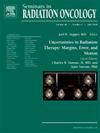Democratizing FLASH Radiotherapy
Abstract
FLASH radiotherapy (RT) is emerging as a potentially revolutionary advancement in cancer treatment, offering the potential to deliver RT at ultra-high dose rates (>40 Gy/s) while significantly reducing damage to healthy tissues. Democratizing FLASH RT by making this cutting-edge approach more accessible and affordable for healthcare systems worldwide would have a substantial impact in global health. Here, we review recent developments in FLASH RT and present perspective on further developments that could facilitate the democratizing of FLASH RT. These include upgrading and validating current technologies that can deliver and measure the FLASH radiation dose with high accuracy and precision, establishing a deeper mechanistic understanding of the FLASH effect, and optimizing dose delivery conditions and parameters for different types of tumors and normal tissues, such as the dose rate, dose fractionation, and beam quality for high efficacy. Furthermore, we examine the potential for democratizing FLASH radioimmunotherapy leveraging evidence that FLASH RT can make the tumor microenvironment more immunogenic, and parallel developments in nanomedicine or use of smart radiotherapy biomaterials for combining RT and immunotherapy. We conclude that the democratization of FLASH radiotherapy represents a major opportunity for concerted cross-disciplinary research collaborations with potential for tremendous impact in reducing radiotherapy disparities and extending the cancer moonshot globally.

 求助内容:
求助内容: 应助结果提醒方式:
应助结果提醒方式:


